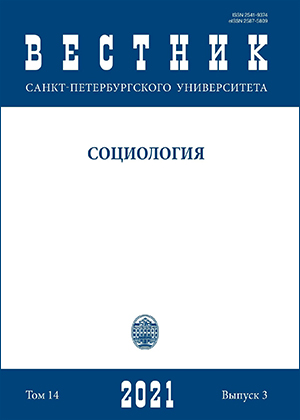Communicative strategies of COVID-trolling on the VKontakte social network
DOI:
https://doi.org/10.21638/spbu12.2021.306Abstract
The activation of trolling accounts during the COVID-19 pandemic, which are usually associated with COVID dissidence and cast doubt on the effectiveness of measures taken to combat the pandemic, has actualized the problem of detecting potentially dangerous accounts on social networks and analyzing the communication strategies they use to influence network users. The article represents the first experience of studying trolling strategies in the discussion of COVID-19 by users of the Russian social network “VKontakte”. Using unique methodology to detect trolling accounts based on the analysis of bursts of network publication activity through comments, combined with the profiling of trolling accounts, allowed us to identify 8 trolling
accounts in the social network “VKontakte” from March 18 to June 10, 2020 according to the specified keywords. To identify their communication strategies, a system of indicators (tactics) was developed that correspond to the strategies of overt and covert trolling. An overt strategy includes such tactics as verbal aggression, emotional tension, provocation, call for confrontation, refuting the official point of view, humiliating the opponent, changing the topic of discussion. A covert strategy includes tactics of irony or ridicule, demonstrating authority, doubting the status quo, “naive questions” and misleading. As a result, it was shown that the analyzed trolling accounts use both overt and covert strategies of influence, with the more aggressive (overt) communicative strategy predominating. The article indicates the prospects
for the research topic’s development: identifying the specifics of COVID-trolling in relation to other contextual and thematic types of trolling; studying the dynamics of COVID-trolling at different stages of the pandemic and the features of COVID-trolling strategies implemented by users of various social networks and different countries; analyzing the degree of impact of COVID-trolling on users.
Keywords:
online trolling, COVID-19, communication strategy, overt trolling, covert trolling
Downloads
References
References
Downloads
Published
How to Cite
Issue
Section
License
Articles of "Vestnik of Saint Petersburg University. Sociology" are open access distributed under the terms of the License Agreement with Saint Petersburg State University, which permits to the authors unrestricted distribution and self-archiving free of charge.




